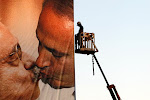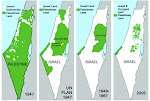Move over, Lucy. Meet Adam. Did modern man originate in Israel, not Africa?
 The proof is not in yet --because these 400,000-year-old teeth have yet to be certified as coming from homo sapiens and not Neanderthals-- but much international excitement has been mounting after a scientist chap, aptly named Avi Gopher, dug up eight teeth in an Israeli archaeological site and announced this discovery to the world (perhaps a bit prematurely, according to at least one Cambridge Don, Paul Mellars.) Without a portion of an ancient skull or jaw bone associated with the teeth, he says it is difficult to verify that these teeth are irrefutable evidence of modern man residing in Israel twice as long as in Africa, as conventional wisdom has it.
The proof is not in yet --because these 400,000-year-old teeth have yet to be certified as coming from homo sapiens and not Neanderthals-- but much international excitement has been mounting after a scientist chap, aptly named Avi Gopher, dug up eight teeth in an Israeli archaeological site and announced this discovery to the world (perhaps a bit prematurely, according to at least one Cambridge Don, Paul Mellars.) Without a portion of an ancient skull or jaw bone associated with the teeth, he says it is difficult to verify that these teeth are irrefutable evidence of modern man residing in Israel twice as long as in Africa, as conventional wisdom has it.
The academics are looking forward to chewing over the various scholarly arguments and weighing the evidence. (And getting more funding for further digs.) Meanwhile, it certainly increases doubts about the existence and/or efficiency of the Tooth Fairy.
Rather appropriately, given such a toothsome topic, this will be the last post on Israelity Bites for a while. Izzy Bee has been away from the Holy Land for some time and feels that biting commentary requires actual presence in the place. Even that goal can be made difficult. Note how the award-winning NPR reporter Lourdes Garcia-Navarro was recently detained and subjected to a strip search while trying to report on Kadima leader Tzipi Livni's presser about delegitimization. Garcia-Navarro's newly-wed husband was also pulled aside and grilled about his association with the ace radio reporter. Her Latina colouring and flashing dark eyes apparently were seen by a trigger-happy security agent as suspiciously Palestinian-like. She was holding government accreditation at the time, and graciously has laughed off the incident as an annoyance that comes with the job. The Foreign Press Association later issued a formal condemnation of the police detail's action. It bodes badly for the press coverage of Israel when reporters are routinely mistreated this way, even after years in the country. Sigh. Israelity Bites.











































